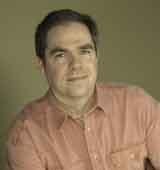

![]()
::: postdoc fellowships
::: senior fellowships
::: resident fellowships
::: associateships
![]()
being here
::: visiting
::: the last donut
::: photo album
::: center home >> people >> visiting scholars >>trout |
||||
| J.D. Trout J.D. Trout (Cornell University) is a Professor of Philosophy and Psychology at Loyola University in Chicago. Before landing on the shores of Lake Michigan, he was a Mellon Postdoc at Bryn Mawr College. He has been a Visiting Professor at Virginia Tech, University of Chicago, and the University of Innsbruck. Trout is a philosopher of science, experimental language researcher, and cognitive scientist. In graduate school he became interested in spoken language processing, both as an amazing cognitive feat and as a field of science. In addition to his early, technical papers in experimental psychology and the philosophy of mind and science, he co-edited a widely-used anthology in the philosophy of science, and another on the doctrine of materialism. For two decades, his work has focused on 4 issues: the view of the world required to account for scientific progress, the reasoning strategies required for intellectual responsibility and improvement, the cognitive and social policies required to advance human well-being and, in Psychology, the modes of lexical address in running speech. When he can, he does experimental research in speech perception as well, and has published the results of this experimental work. These experiments use speech-like stimuli to probe a listener's reaction to specific dimensions of speech. He has used both sinewave and noiseband speech. Also, he has written about theoretical issues that divide practitioners in the areas of language and speech research -- such as the biologically "special" character of spoken language in humans. His project at the Center first looks at the psychological machinery of explanation, and then attempts to characterize the progressive role that explanation actually plays in the development of mature scientific theories. He fishes as often as he can (his gear is in Pittsburgh), and works on the house whenever he finds the excuse. |
|
|||
